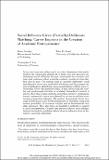Social Influence Given (Partially) Deliberate Matching: Career Imprints in the Creation of Academic Entrepreneurs
Author(s)
Liu, Christopher C.; Stuart, Toby E.; Azoulay, Pierre
DownloadAzoulay_Social influence given.pdf (748.2Kb)
PUBLISHER_POLICY
Publisher Policy
Article is made available in accordance with the publisher's policy and may be subject to US copyright law. Please refer to the publisher's site for terms of use.
Terms of use
Metadata
Show full item recordAbstract
Actors and associates often match on a few dimensions that matter most for the relationship at hand. In so doing, they are exposed to unanticipated social influences because counterparts have broader attitudes and preferences than would-be contacts considered when they first chose to pair. The authors label as “partially deliberate” social matching that occurs on a small set of attributes, and they present empirical methods for identifying causal social influence effects when relationships follow this generative logic. A data set tracking the training and professional activities of academic biomedical scientists is used to show that young scientists adopt their advisers’ orientations toward commercial science as evidenced by adviser-to-advisee transmission of patenting behavior. The authors demonstrate this in twostage models that account for the endogeneity of matching, using both inverse probability of treatment weights and an instrumental variables approach. They also draw on qualitative methods to support a causal interpretation. Overall, they present a theory and a triangulation of methods to establish evidence of social influence when tie formation is partially deliberate.
Date issued
2017-01Department
Sloan School of ManagementJournal
American Journal of Sociology
Publisher
University of Chicago Press
Citation
Azoulay, Pierre et al. “Social Influence Given (Partially) Deliberate Matching: Career Imprints in the Creation of Academic Entrepreneurs.” American Journal of Sociology 122, 4 (January 2017): 1223–1271 © 2017 University of Chicago
Version: Final published version
ISSN
0002-9602
1537-5390